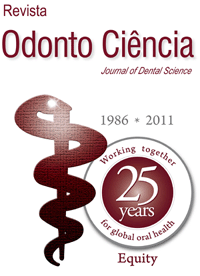OBJECTIVE: To determine the impact of Burning mouth syndrome (BMS) on the quality of life of patients by means of the World Health Organization Abbreviated Instrument for Quality of Life Assessment (WHOQOL-26). METHODS: A total of 116 patients were selected, 58 with BMS and 58 controls. Individuals with changes in the hemogram and in the blood levels of glucose, iron, folic acid and vitamin B12 were excluded, as well as those who used antidepressant and/or anxiolytic drugs or who showed a salivary flow rate of less than 0.1 mL/min. RESULTS: The overall score of the WHOQOL-26 was significantly lower in the group with the disorder (P<0.001). The patients with BMS also displayed significantly lower scores when compared to controls in relation to the psychological and physical domains of the instrument (P=0.005 and P<0.001, respectively). There was no significant difference between BMS and control patients with respect to scores of the social and environment domains. CONCLUSIONS: BMS interferes with the quality of life of patients in a negative way, and therefore, its management is a challenge for the clinicians, who should treat the individual with this disorder in a broader context.
Burning mouth syndrome; quality of life; oral health


